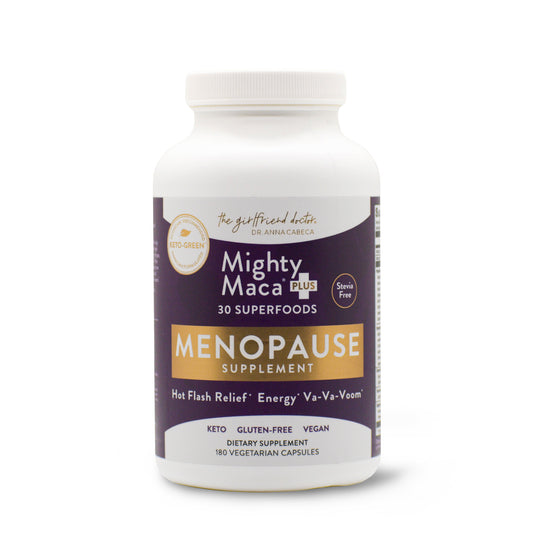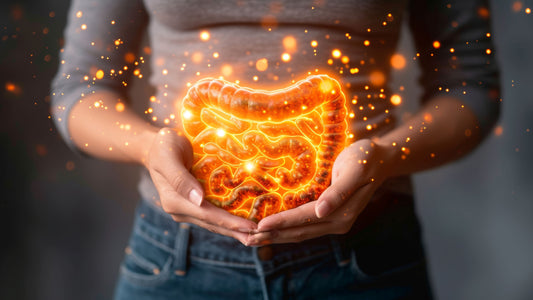Have you ever been in a meeting and felt a wave of exhaustion wash over you? Gotten at least eight hours of sleep but still felt tired during the day? Wanted a nap at 3 PM and then felt a wave of energy at night?
In menopause, you may experience sudden crashing fatigue, and/or a lack of energy that seems to follow you around at all times.
Female hormonal imbalance is typically at the root of the problem, but there are several different ways your hormones can sabotage your energy levels.
In this article, we’ll explore:
Some of the most common causes of sudden and chronic fatigue in females
Lifestyle factors that can contribute to the crashing fatigue you’re feeling
Strategies to help get things back on track so you can have energy all day long

What Does Fatigue Feel Like?
Fatigue takes a couple of different forms.
First, there’s the sudden crashing fatigue. You’re feeling fine, going about your day, and then it’s like a switch gets flipped. You feel exhausted. Your brain gets sluggish. Sudden fatigue attacks you. You may even have to lie down for a non-negotiable quick power nap.
Then there’s the more chronic fatigue. The kind where you want to sleep all the time and have no energy. It may feel difficult to get out of bed, and finding the energy to perform everyday tasks is difficult. Your body feels weak and tired, pretty much all the time.
For many women in menopause, both types of fatigue are common. Let’s look at why.
Why Am I Always Tired And Have No Energy? (Female)
There are several reasons you may feel tired all the time or tired all of a sudden. Some of them are biological, and some are a result of lifestyle habits.
Let’s tackle the biological reasons first.

1. Hormonal Changes: Fatigue And Menopause
When you’re a middle-aged woman and tired all the time, the first things to investigate are your sex hormones. Because so often, the answer to the question, “Why am I always tired and have no energy?” is — “You’re a female in menopause.”
Major changes to your energy levels often start to crop up in perimenopause, which are the years before you officially stop cycling. It’s one of those sneaky signs of perimenopause that you might mistake for “just feeling more tired than usual.”
When you are still cycling, the second half of your cycle (called the luteal phase) your progesterone levels tend to rise. If your estrogen levels are low, this may exacerbate feelings of fatigue.

2. Chronic Fatigue Syndrome
Chronic Fatigue Syndrome (CFS), also known as Myalgic Encephalomyelitis (ME), is a severe, long-term condition that causes extreme fatigue. Unlike regular tiredness, this fatigue doesn’t improve with rest and can be debilitating. (1)
Many women with CFS report that even minor physical or mental activities can trigger energy crashes that last for days. Though the exact cause of CFS is unknown, it’s believed to involve a combination of genetic, environmental, and immune system factors.
Some people with CFS have lower levels of the stress hormone cortisol than others. But, others with CFS have cortisol levels that are considered in the normal range. (2)
There’s also some evidence to suggest that women who experience earlier menopause, gynecological problems and have had gynecological surgeries may be more likely to develop CFS, which indicates a hormonal link. (3)

3. Anemia Symptoms
Anemia, particularly iron deficiency anemia, is a common cause of sudden fatigue in women, especially during or after menstruation, perimenopause, and postmenopause.
Anemia occurs when your body lacks enough healthy red blood cells to carry adequate oxygen to tissues, causing a persistent feeling of tiredness. Women who experience heavy periods, or those with dietary restrictions, are at higher risk of anemia. Without proper treatment, this condition can worsen and lead to more frequent and severe bouts of fatigue.
Other symptoms of anemia may include:
Heart palpitations
Shortness of breath
Headache
Itchiness
Hair loss
Iron supplementation during perimenopause and menopause can get tricky, as once you stop menstruating, your iron needs decline. Plus, it can take some time before iron supplementation helps to raise your iron levels effectively. Be sure to work with your doctor to figure out the right balance for you.

4. Nutritional Deficiencies
Iron deficiency isn’t the only nutrient deficiency that can steal your energy. Low levels of vitamins like D and B12 are also linked to energy crashes.
One of the best ways to make sure you’re getting all the nutrients you need is to fine-tune your diet to support your hormones and energy levels. Eating plenty of healthy fats, vegetables, and protein can help stabilize energy, restore hormone balance, and help you lose a few pounds, too.
For healthy recipes and inspiration, be sure to grab my Keto-Green® recipe guide here.

5. Thyroid Disorders
Thyroid disorders are common during menopause. And a lot of the symptoms of thyroid troubles overlap with the symptoms of menopause, one of the most glaring being fatigue.
Thyroid conditions disrupt your metabolism, which makes energy levels unpredictable.
If you’re feeling cold all the time, your hair’s falling out, your skin is dry, and you’re also feeling super tired, it may be a good idea to investigate your thyroid function with your doctor.

6. Hypothalamic Pituitary Adrenal (HPA) Axis Dysfunction (AKA Adrenal Fatigue)
Prolonged stress can overwork the adrenal glands, which produce cortisol to help manage stress. When the adrenal glands are overworked, it can result in sudden energy crashes, leaving you feeling drained without warning. Sometimes, women feel tired all day and then “wired and tired” at night when their adrenals are not functioning optimally.
Adrenal health is particularly important in perimenopause and menopause. When you nourish your adrenals properly, they can serve as an important backup generator for sex hormones when your ovaries start to back off production.
We’ll cover important ways to support your adrenals later, but one of my non-negotiable daily supplements is my adaptagenic (adrenal supportive) drink mix, Mighty Maca® Plus. It’s amazing for supporting energy levels because it gives your adrenals what they need to jumpstart energy levels. Check out Mighty Maca here.
We’ll cover important ways to support your adrenals later, but one of my non-negotiable daily supplements is my adaptagenic (adrenal supportive) drink mix, Mighty Maca® Plus. It’s amazing for supporting energy levels because it gives your adrenals what they need to jumpstart energy levels. Check out Mighty Maca here.

7. Mental Health
Anxiety and depression can certainly affect energy levels. The constant emotional strain can deplete the body’s energy reserves. Women dealing with ongoing mental health struggles often find themselves feeling completely exhausted after stressful events or periods of anxiety.
Mental health struggles in menopause are common. If you’re feeling unsettled, nervous, tense, frustrated by every little thing, and fatigued, it’s important to discuss these symptoms with your doctor. Addressing underlying hormone imbalances that occur during menopause can sometimes help with your mental health and your overall energy levels.

Insulin resistance is one of the most overlooked causes of fatigue, especially in peri/menopausal women.
Insulin resistance occurs when the body’s cells don’t respond properly to insulin, which leads to blood sugar imbalances. This can cause energy levels to fluctuate dramatically, resulting in sudden feelings of exhaustion after meals or between meals when blood sugar levels drop.
Managing blood sugar through diet and exercise could help prevent these crashes.
How To Stop Feeling Tired
Beyond underlying biology and medical conditions, lifestyle habits can play a significant role in exacerbating sudden crashing fatigue.
The choices we make each day regarding sleep, diet, and physical activity often have a cumulative effect on our overall energy levels.
As I mentioned before, you’ve got to protect your adrenal health with every fiber of your being if you want to maintain energy levels during menopause. My favorite way to do that is with a couple of daily shots of Mighty Maca® Plus. It’s loaded with superfoods that help you feel like you can climb a mountain every day. Learn more about Mighty Maca Plus here.
Let’s explore the most common lifestyle factors that contribute to fatigue, and adrenal health — and look at some small adjustments that could make a big difference in your energy levels.

1. Poor Sleep Patterns
Inadequate sleep or irregular sleep patterns are major contributors to fatigue. Even if you think you’re getting enough hours of sleep, the quality of that sleep matters just as much.
When you’re waking up at night because of hot flashes, having to use the restroom, or generally having trouble staying asleep, it can certainly affect how you feel the next day. Again, this is where Mighty Maca Plus really shines. It can help you feel more like yourself during the day and put the smackdown on hot flashes at night.
In addition to hot flash support, try changing some of your sleep routines:
-
Establish a regular sleep schedule by going to bed and waking up at the same time each day.
Create a calming bedtime routine, such as reading or meditation, to signal to your body that it’s time to rest.
Limit exposure to screens (phones, computers, TVs) an hour before bed to allow your brain to wind down.

2. Diet and Hydration
What you eat and drink throughout the day can have a profound effect on your energy levels. A diet that’s high in processed foods, refined sugars, and caffeine may lead to short bursts of energy followed by sharp crashes.
Similarly, dehydration can make you feel sluggish and exhausted, even if you haven’t done much physical activity. If you’re not eating balanced meals or skipping meals entirely, this can trigger a blood sugar crash, leaving you feeling drained.
How to improve:
Prioritize balanced meals with a mix of healthy fats and protein to maintain steady energy throughout the day.
Drink plenty of water to stay hydrated, aiming for at least 8 glasses a day.
Limit caffeine intake, especially later in the day, as it can interfere with sleep and contribute to energy crashes.

While it’s easy to assume that rest will preserve energy, remaining inactive throughout the day actually leads to a sluggish metabolism and increased fatigue. Regular exercise promotes better sleep, improves circulation, and releases endorphins, which help improve mood and energy.
Here’s what I recommend:
Incorporate at least 30 minutes of moderate exercise into your daily routine, whether it’s a walk, yoga, or a resistance workout.
Break up long periods of sitting with brief moments of movement—stretching, walking, or light exercises can boost energy levels.
Find an activity you enjoy to make exercise a consistent part of your lifestyle.

4. Work-Life Balance
Burnout is a common problem for women juggling multiple roles, such as managing a career, family, and personal responsibilities. Overworking and not allowing yourself adequate time to rest and recharge can lead to severe energy depletion.
As women, we’re often expected to push through exhaustion to meet deadlines or family obligations, which can result in recurring energy crashes over time. You’ve got to prioritize your health and self-care if you want to restore your energy levels.
Here’s how to make changes:
Set clear boundaries between work and personal time to ensure you have periods of rest.
Schedule regular breaks throughout the day, even if it's just 10 minutes to step away and relax.
Practice self-care by prioritizing activities that help you unwind, whether it’s spending time with loved ones, reading, or practicing mindfulness.
Sudden Crashing Fatigue: Female Hormones + Energy
By making small changes in your life, you can help prevent some of the things that contribute to sudden crashing fatigue. Healthy sleep habits, proper nutrition, regular movement, and a balanced schedule all play a critical role in maintaining energy levels.
And, remember, when you support your adrenals, they support you!









